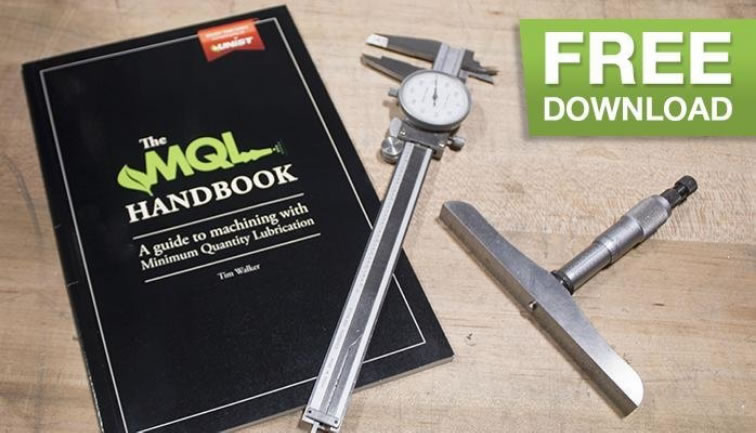Minimum Quantity Lubrication equipment manufacturer Unist has put together an informative booklet titled “The MQL Handbook.” The Handbook has some great insights into MQL including basics such as how MQL works and also information on what makes a good application system, setup considerations, fluid selection, and more. Currently, you can download a .pdf copy for free on their website.
Author Archives: mqlGuru
Article: Pros and Cons of MQL and Flood Coolant
Unist’s Senior Vice President examines the pros and cons of Minimum Quantity Lubrication and flood coolants.
Tim explains the advantages of MQL and explains important considerations when comparing it to flood coolant. A great article from the October, 2016 issue of TLT (Tribology & Lubrication Technology) Magazine and a good read for anyone considering making the switch to MQL!
Article: Getting the Most from MQL
Production Machining magazine’s Chris Felix offers a broad view of minimum quantity lubrication along with a closer look at MQL in turning operations.
Click to read the entire article on Production Machining’s website!
MQL Saves More Than Just Oil!
The ‘M’ and the ‘Q’ in ‘MQL’ stand for ‘Minimum Quantity.’ The small amount of cutting fluid used is often the main focus of those looking at MQL for the first time (as well as MQL’s many other benefits of course!). Another ‘Minimum Quantity’ that MQL brings to the table is that of water. A recent article explains how Ford Motor Company reduces not only its use of metal-working fluids (MWFs), but also its water consumption. While Ford has been in the spotlight before for its adoption of MQL, Interestingly enough, only six of Ford’s 65 plants worldwide have switched to MQL machining. A quick, but interesting read!
The MQL Handbook: A great primer on Minimum Quantity Lubrication

The MQL Handbook is an informative intro to Minimum Quantity Lubrication and is a solid read for both MQL newcomers and veterans alike. Written by Unist’s Tim Walker, the handbook delves into the fundamentals of MQL and also into the nuances of the process which can make or break the ‘MQL experience.’
Kudos to Tim and Unist for all the work that went into the MQL Handbook!
Interesting Minimum Quantity Lubrication Video!
A great video outlining the basics of MQL produced by minimum quantity lubrication system manufacturer Unist, Inc. Perfect for those who are new to MQL!
httpvh://www.youtube.com/watch?v=aP3glc4HoWg
Useful information on the Unist website as well.
Great article on MQL from Green Manufacturer
A great article on Minimum Quantity Lubrication was recently written by Doug Watts of Green Manufacturer Magazine. The article does a good job explaining the basics of MQL and also the Environmental and cost-saving benefits of implementing MQL. Definitely worth a quick read if you’ve heard of MQL and are curious about the hype. Doug sums it up nicely when he says “MQL is based on a simple principle: Use only what is needed for the application, reducing consumption and waste, and deliver the lubricant precisely where it is needed.”
Thanks for the great article Doug!
Minimum quantity lubrication machining process maximizes environmental, cost savings
What is Minimum Quantity Lubrication (MQL)?
Minimum Quantity Lubrication (MQL) or ‘Near Dry Machining’ (NDM), as it is sometimes referred to, is an alternative to the use of traditional metal working fluids (MWFs). Where traditional MWFs or ‘coolants’ are applied in flood fashion to the cutting zone to dissipate the heat caused by the friction of the metalcutting process, MQL takes a different approach and applies an ultra-thin layer of lubricant and reduces the friction (and heat) between the cutting tool and the workpiece. MQL delivers an aerosol spray comprised of a balanced mixture of lubricant and air to the cutting zone and does so in very minimum quantity (hence the name).
Welcome
Welcome to minimumquantitylubrication.com! This website is here to foster discussion and information related to ‘MQL’ (Minimum Quantity Lubrication) technology. MQL is a relatively new lubrication technology for metal cutting which consists of a lubricant applied in very small quantities via an atomized spray to the interface of the cutting tool and the work piece. Where traditional flood coolant practices attempt to cool down the tool by flooding the interface with a water-based coolant, MQL seeks to properly lubricate the interface thereby reducing friction and heat build-up before heat even becomes an issue.

